Iran Warns of Retaliation Against Unloading Seized Tanker's Oil

Iran's IRGC navy commander warned that Tehran would retaliate against any oil company involved in unloading Iranian oil from a seized tanker.

Iran's IRGC navy commander warned that Tehran would retaliate against any oil company involved in unloading Iranian oil from a seized tanker.
Alireza Tangsiri issued the warning as US prosecutors struggled to auction seized Iranian oil from a Greek tanker near Texas.
According to a report by The Wall Street Journal on Tuesday, the auctioning of 800,000 barrels of seized Iranian oil has been met with reluctance from US companies due to fears of Iranian retaliation. Companies with exposure in the Persian Gulf region are particularly wary, with concerns that they could become targets of Iranian aggression.
"We hold the oil company that wants to unload our oil from this ship responsible, and we also hold Washington responsible," Tangsiri declared.
The standoff sheds light on the complexities and challenges faced by the US government in enforcing sanctions against Iran. Iran's increased attacks against Western shipping interests serve as a deterrent to interdicting Iranian exports, making it difficult for the US to proceed with the auction of the seized oil.
In recent months, Tehran's military forces have hijacked several Western tankers in what is seen as retaliation for previous Western seizures of Iranian oil. This ongoing cycle of aggression has escalated tensions in the region and poses significant difficulties for the international community in maintaining stability and maritime security.
In response to the escalating situation, the US Defense Department announced on Monday that it would deploy F-35 jet fighters and a Navy destroyer to the Middle East. The deployment aims to deter further Iranian seizures of tankers and to address Russian aggression in the region.
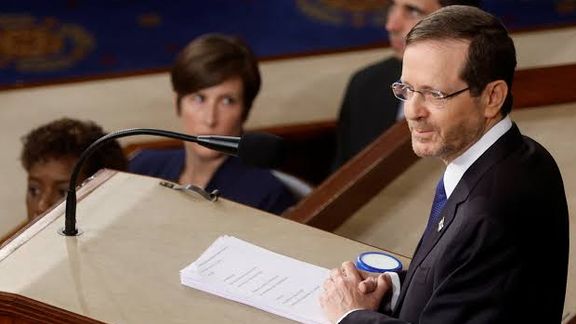
On a high profile visit to the United States, Israel’s President Isaac Herzog called Iran “the greatest challenge Israel and the United States face at this time”.
Referring to the regime’s ongoing development of its nuclear program, he told the joint session of the US Congress: “Let there be no doubt: Iran does not strive to attain nuclear energy for peaceful purposes. Iran is building nuclear capabilities that pose a threat to the stability of the Middle East and beyond.”
Meanwhile, the UK’s Foreign Secretary, James Cleverly, echoed his sentiments at a fireside chat in Aspen, US, in which he said the UK is committed to working with its allies in the US, Europe and the Middle East “to ensure that we never see a nuclear-armed Iran”.
Both leaders stressed the global threats Iran poses, from its proxies across the Middle East to its foiled attacks in countries including at least 15 in the UK alone, as well as recent plans to attack Jewish and Israeli targets in Greece, Cyprus and Azerbaijan.
“Every country or region controlled or infiltrated by Iran has experienced utter havoc,” Herzog said. “We have seen this in Yemen, in Gaza, in Syria, in Lebanon, and in Iraq. In fact, we have seen this in Iran itself where the regime has lost its people, and is suppressing them brutally.”
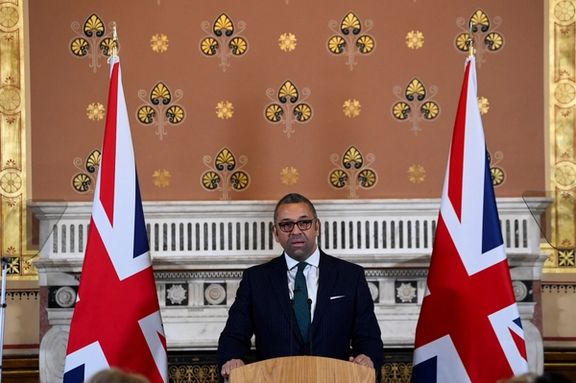
The two leaders were speaking as the UK had imposed yet further sanctions on the country, ramping up on several months of penalties for both ongoing nuclear activity and the brutal suppression of protesters since September’s uprising in the wake of the death in morality police custody of Mahsa Amini.
“We maintain a tough and robust position towards Iran and that will remain our position,” Cleverly said. “If Iran does not like the UK’s response, then Iran needs to change its behavior. Our actions are in response to their behavior.”
Herzog also raised the issue of Iran’s arming Russia in its war in Ukraine, a claim the regime denies but more recently, evidence has shown the cooperation continues, and now it has been revealed that the two nations are building a joint weapons plant.
He said: “Iran has spread hatred, terror, and suffering throughout the Middle East and beyond, adding fuel to the disastrous fire and suffering in Ukraine.”
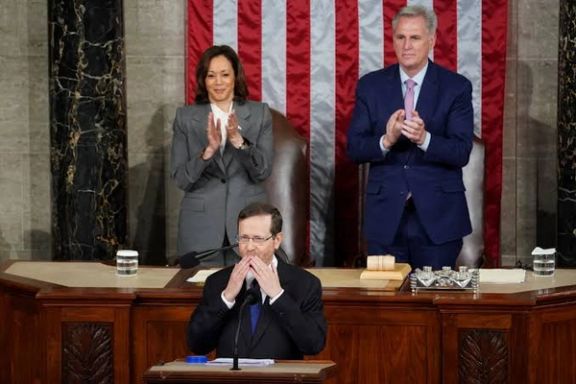
The Israeli President addressed in candid detail the threat posed to the Middle East’s only democracy. “Iran is the only nation on the planet publicly calling, plotting, and developing means to annihilate another nation, a member of the family of nations, the State of Israel. Israel has no border with Iran. Israel has no resources contested by Iran. Israel has no conflict with the Iranian people. And yet, the Iranian regime – together with its proxies throughout the Middle East – is aiming and working towards destroying the State of Israel, killing the Jews, and challenging the entire free world,” he told Congress.
He said that allowing Iran to become a nuclear threshold state, “whether by omission or by diplomatic commission, is unacceptable”, calling on the world not to remain indifferent to the Iranian regime’s call to wipe Israel off the map.
“Tolerating this call and Iran’s measures to realize it, is an inexcusable moral collapse,” he said, calling on the US to work with the Jewish state to prevent Iran’s fundamental threat to international security.
“I am here to reiterate what every Israeli leader has declared for decades: the State of Israel is determined to prevent Iran from acquiring nuclear weapon capabilities,” he added.
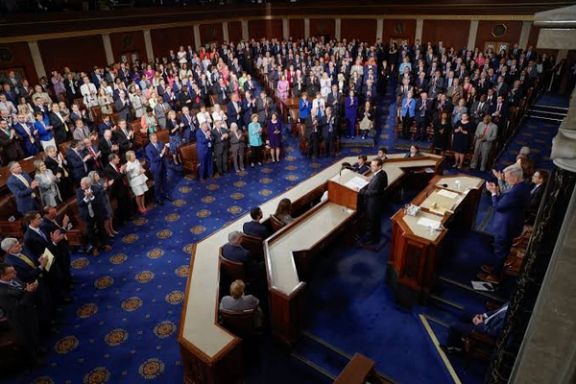
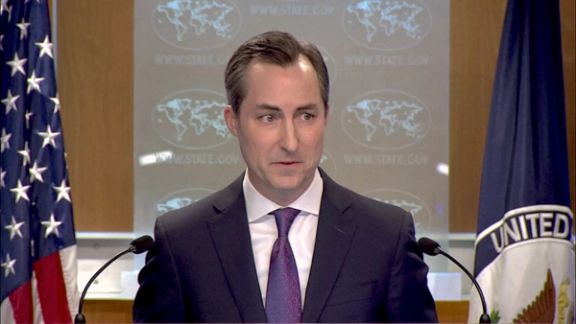
US State Department Wednesday confirmed earlier reports about a change in Iraq’s payment method to Iran for imports of energy, allowing funds to go to non-Iraqi banks.
Reuters reported Monday that Secretary of State Antony Blinken had signed a 120-day waiver under current US sanctions on Iran to allow Baghdad to pay for Iranian energy imports and deposit such payments into non-Iraqi banks in third countries.
State Department spokesman Matthew Miller confirmed the news during his daily press briefing on Wednesday adding that “The one thing that is different about this renewal is that this latest package also expands the waiver to authorize the transfer of funds from those restricted accounts in Iraq to restricted accounts in select third-party banks.”
Miller emphasized that Iran can use the funds in non-Iraqi banks only to buy non-sanctionable goods, which essentially means food and medicine. He explained, “these funds will remain in accounts where they can only be used for non-sanctionable activity, and with every transaction approved in advance by the Department of Treasury.”
At the same time, The Wall Street Journal reported Wednesday that the US Treasury Department and the Federal Reserve Bank of News York have banned 14 Iraqi banks from conducting US dollar transactions.
The report added that US officials acted against these Iraqi banks after uncovering information that they engaged in money laundering and fraudulent transactions, some of which may have involved sanctioned individuals, raising concerns about benefiting Iran.
The decision to allow Iraqi payments to be transferred to non-Iraqi banks could be related to long-standing suspicions of Iranian money-laundering efforts to transfer US dollars to Iran, which is short of hard currencies.

Amid reports that the Biden administration has allowed Iraq to pay Iran for electricity via non-Iraqi banks, the US has imposed a ban on 14 Iraqi banks from conducting dollar transactions.
According to a report by the Wall Street Journal on Wednesday, the ban, imposed by the Treasury Department and the Federal Reserve Bank of New York, is part of an effort to crackdown on the flow of US currency to Iran and other sanctioned Middle East countries.
The targeted banks are mostly small institutions, even by Iraqi standards. Some of these banks have ties to influential Iraqis, are known for financial connections with Iran, or have heavy involvement in dollar transactions. Among those on the US list are Al Mustashar Islamic Bank, Erbil Bank, World Islamic Bank, and Zain Iraq Islamic Bank.
The newspaper added that US officials have taken action against these Iraqi banks after uncovering information that they engaged in money laundering and fraudulent transactions, some of which may have involved sanctioned individuals, raising concerns about benefiting Iran.
"We have strong reason to suspect that at least some of these laundered funds could end up going to benefit either designated individuals or individuals who could be designated," a senior US official was quoted as saying by the Journal."And of course the primary sanctions risk in Iraq relates to Iran."
According to the officials, the main goal of the dollar restrictions was to choke off money-laundering in Iraq.
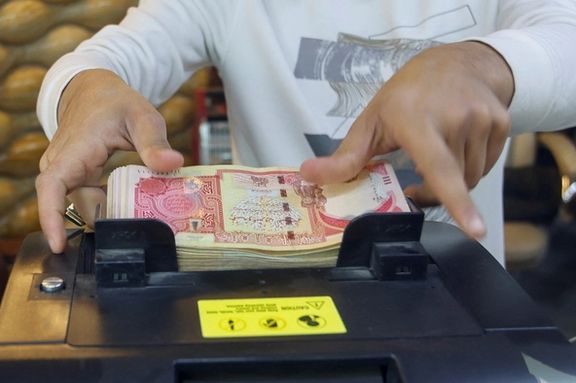
Iran International revealed in May that an aide to former IRGC’s Quds force commander Qassem Soleimani is a key figure in money laundering for Tehran. Earlier in the year, Iran International also unraveled some details about the inner workings of a Quds force unit tasked with smuggling money from Iraq to Iran, proving that the Islamic Republic’s embassy in Iraq is also involved in the money laundering operations aimed at funneling revenues from oil and gas exports back to Iran.
This financial network is bypassing the US sanctions at the cost of the Iraqi economy. An informed source in Baghdad told Iran International late in December that Washington has received reports that Iraq is still conducting trade with Iran using US dollars despite sanctions.
The new move by Washington, which probably provokes new tensions between Baghdad and Washington and could lead to more economic turmoil for ordinary Iraqis, was announced only hours after Reuters reported that Secretary of State Antony Blinken has signed a 120-day national security waiver allowing Iraq -- heavily dependent on Iranian electricity -- to deposit payments into non-Iraqi banks in third countries instead of into restricted accounts in Iraq.
Moreover, the Treasury recently approved a payment of 2.5 billion euros, equivalent to about $2.8 billion, toward unpaid debts by the Iraqi government for Iranian electricity and gas imports, which had been frozen by sanctions.
Despite rumors of the Biden administration's intentions to lower tensions with Iran, these new restrictions signal a hardening of sanctions enforcement against Iran. Earlier this week, the Pentagon also dispatched a warship and jet fighters to the region, saying it was in response to Iranian threats against commercial shipping in the Persian Gulf.
The United States has insisted that oil-rich Iraq, the OPEC group's second-largest producer, moves towards self-sufficiency, and has put pressure on Baghdad to stem the flow of dollars into neighboring Iran.
The dinar went into a tailspin against the dollar after the New York Federal Reserve imposed tighter controls on international dollar transactions by commercial Iraqi banks in November to halt the illegal siphoning of dollars to Iran.
Under the curbs that took effect in January, Iraqi banks must use an online platform to reveal their transaction details. But most private banks have not registered on the platform and resorted to informal black markets in Baghdad to buy dollars.
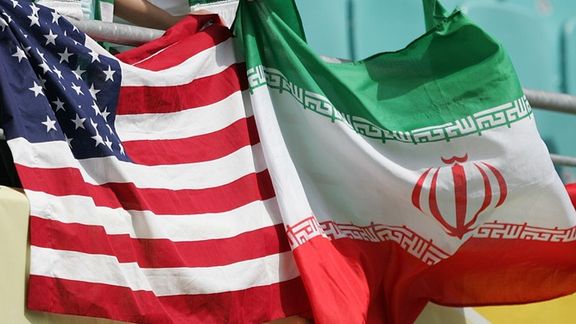
While the chances of reviving Iran’s 2015 nuclear appear dim, an Iranian politician claims that Washington and Tehran have established a hotline for communication.
Former chief of the Iranian parliament's national security and foreign policy committee Heshmatollah Falahatpisheh said Wednesday that “What exists between Iran and the United States now is similar to the 'red telephone line' that existed between the United States and the Soviet Union during the Cold War.”
He added, “I proposed a similar suggestion in the parliament to establish a direct hotline of communication between Iran and the United States to manage the tensions.”
Established in 1963, the Moscow–Washington hotline links the Pentagon with the Kremlin. Although the hotline was never a telephone line, and no red phones were used, in popular culture it is known as the "red telephone.”
His remarks come after recent reports that the two sides were striving to reach an unofficial unwritten agreement to prevent escalation. However, many US lawmakers from both sides of the aisle have called on the Biden administration to come clean about its dealings with the Iranian regime, particularly after the US special envoy Robert Malley was dismissed last month, with Congress in the dark.
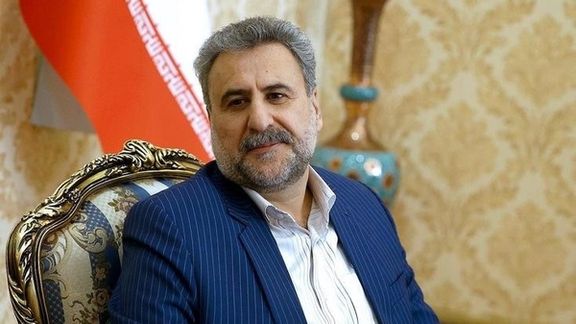
Falahatpisheh said that in a situation when reviving the JCPOA (Joint Comprehensive Plan of Action) seems practically unattainable, this kind of communication is the best possible outcome Iran and the United States could achieved.
“What is referred to as the 'unwritten agreement' is essentially the formation of this hotline for communication. Iran and the United States have not reached a formal agreement, but they are managing the existing tensions in their relationship,” he said.
He underlined that “The establishment of this hot line does not imply anything specific except that the two countries have direct and indirect (mostly secretive) interactions with each other at any given time, discussing tensions and preventing crises from escalating.” He made it clear that “there is no written agreement taking shape.”
The Biden administration says that it continues contacts with Tehran, but no nuclear or prisoner release agreement is imminent.
According to Falahatpisheh, Washington’s lax enforcement of sanctions on Iran's oil exports and Tehran’s tendency to avoid tensions in the Persian Gulf are the outcomes of such a mechanism to manage differences.
But some events could be seen as contradicting this scenario. The US military announced in early July that it intervened to prevent Iranian naval vessels from seizing two commercial ships in the Persian Gulf.
Pentagon announced on Monday that it was sending more warplanes and an additional warship to the region, mainly to provide maritime security.
Meanwhile, US lawmakers are intensifying efforts to restrict the Biden administration in its interactions with the Iranian regime.
On Monday, Michael McCaul (R-TX), the chairman of the US House foreign affairs committee, threatened a subpoena if the administration does not brief Congress on the circumstances of Rob Malley’s dismissal, noting that the State Department has been less than candid with his security clearance investigation.
However, the administration still sounds reluctant to divulge any information as White House Press Secretary Karine Jean-Pierre dodged questions about the investigation on Tuesday.
Moreover, on the backdrop of a flurry of Congressional initiatives and letters to the administration, eight Republican Senators wrote to Secretary of State Antony Blinken and the Secretary of the Treasury Janet Yellen, demanding more serious enforcement of US sanctions on Iran.
The senators raised the issue of China’s increasing oil imports from Iran, while US sanctions prohibit third parties from buying Iranian oil and oil products. “Despite sanctions, the People's Republic of China (PRC) has purchased roughly $47 billion in Iranian oil since President Biden took office,” the letter says.
Despite the push by lawmakers, Washington has made a change in the way Iraq pays Iran for electricity. According to an exclusive report by Reuters, the Biden administration on Tuesday moved to let Iraq pay Iran for electricity via non-Iraqi banks.
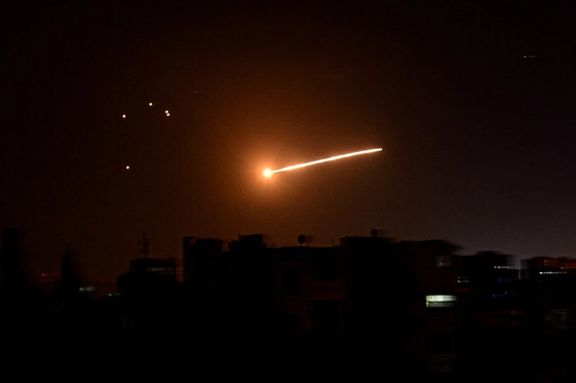
Two soldiers were wounded during an Israeli airstrike on Damascus, the Syrian state news agency, SANA, reported on Wednesday.
According to a Syrian military source cited by SANA, the attack was carried out by Israeli warplanes targeting the suburbs of Damascus from the Golan Heights.
The military source claimed that the majority of the missiles launched by Israel were intercepted and destroyed by the Syrian army's air defense systems. However, the attack still resulted in injuries to two soldiers and caused material damage in the area.
Reports from opposition-affiliated news websites suggest that the strikes targeted facilities in the western part of Damascus, near Qudsiyah. Images depicting numerous fires in the aftermath of the attacks have surfaced on social media platforms.
The Syrian Observatory for Human Rights, a London-based war monitoring group, confirmed that this incident marks the 20th time Israel has launched attacks on Syrian targets this year. Iran intervened in Syria's civil war in 2011 to support Bashar al-Assad's regime, by deploying tens of thousands of troops and fighters.
On July 2, the most recent Israeli air attack on Syria was reported, with Syria's military confirming that Israel had targeted areas near the central city of Homs. The attack resulted in material damage, but there were no reported casualties.
Since 2017, Israel has conducted multiple airstrikes on Iran-related targets in Syria, where Tehran has established bases and weapons depots, including international airports in Damascus and the northern city of Aleppo. Israel has vowed to check Iran's attempts to establish a strong military presence in Syria.